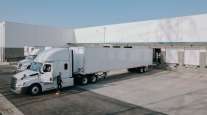Cosco Clears US Hurdle on Orient Overseas With Wharf Sale

Cosco Shipping Holdings Co. pledged to sell a container terminal in California, helping allay concerns of U.S. regulators and clearing the way for its $6.3 billion acquisition of Orient Overseas International Ltd. announced last year.
The state-owned shipping giant signed a national security agreement with the U.S. on July 6 to dispose of the Long Beach facility to a third party, according to a filing. The Committee on Foreign Investment in the U.S., known as CFIUS, was reviewing the transaction, which would shift ownership of the Long Beach terminal to Cosco from Hong Kong-based OOIL.
RELATED: Cosco Shipping offers $6.3 billion to buy Orient Overseas
RELATED: Cosco Shipping to sell $947 million of Orient Overseas shares
With the sale agreement, CFIUS has notified parties involved in the deal that there are no unsolved issues linked to U.S. national security, according to Cosco’s filing, which didn’t elaborate on a buyer or valuation. Bloomberg Intelligence estimates the facility could be worth at least $1 billion.
“Cosco would have loved to have the Long Beach terminal but they bought OOIL more for what it could bring to Cosco,” Rahul Kapoor, a Bloomberg Intelligence analyst, said by phone July 9.
“OOIL’s network, technology and customer base are the main reasons why Cosco bought OOIL.”
Under the accord with the departments of Homeland Security and Justice, pending its disposal, the ownership of the terminal will be transferred to a trust, whose principal trustee must be a U.S. citizen and not a shareholder of OOIL, and should be independent of Cosco Shipping as well.
The transaction had won a nod from China’s Anti-Monopoly Bureau about a week ago, removing the final obstacles to the creation of a container line that would become the world’s No. 3 by capacity after A.P. Moller-Maersk A/S and Mediterranean Shipping Co. Cosco’s acquisition of OOIL is part of a sweeping consolidation within the industry that has struggled with overcapacity, a plunge in freight rates and accumulated losses.
Shares of Cosco rose 2.1% to HK$3.42 as of 9:36 a.m. in Hong Kong. The stock traded in Shanghai gained 0.4% to 4.69 yuan.
OOIL has been operating Long Beach’s Middle Harbor Terminal under a 40-year lease that started in 2012. It is one of the world’s most automated shipping facilities and its redevelopment is due to be completed next year. Port of Long Beach, together with the adjacent Port of Los Angeles, is the largest shipping facility in the U.S.
The stepped up scrutiny of Chinese takeovers of U.S. assets comes as trade tensions between the world’s two biggest economies turned into a tariff war, with both the countries imposing levies on each other’s goods last week. Since the Trump administration took office last year, at least 10 Chinese deals for U.S. firms have collapsed.
Naval Support
Cosco also provides important logistics support to the Chinese navy, especially in support of its activities beyond the Chinese mainland, according to Timothy Heath, a senior international defense research analyst at Rand Corp.
CFIUS, which is led by the Treasury Department, doesn’t comment on its reviews, which are confidential.
The OOIL deal isn’t the first time Cosco has attracted attention over its plans at the Long Beach port. In the 1990s, some members of Congress raised security concerns about a plan to build a container terminal at a closed naval station and lease it to Cosco. A review by CFIUS at the time found “no credible evidence” that Cosco, which had been operating at the port since 1981, could threaten the U.S.
With assistance from Dong Lyu, David McLaughlin and Kyunghee Park.




